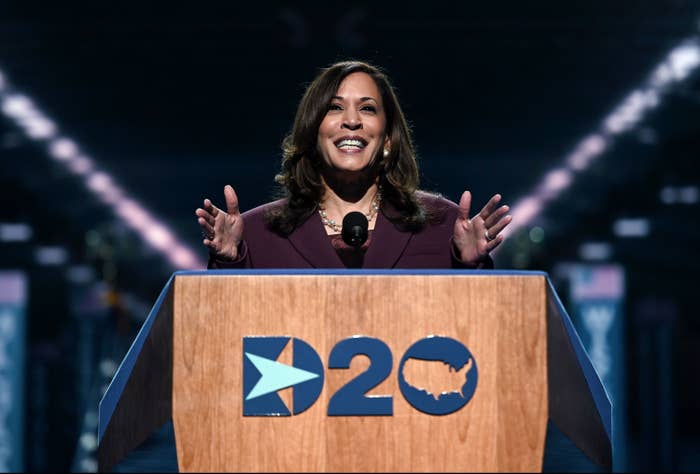
When Kamala Harris was introduced for the first time to millions of Americans who knew little of her identity, or her personal history, it was with a simple phrase: “The daughter of immigrants. The daughter of Shyamala.”
Harris accepted the Democratic nomination for vice president at the Democratic National Convention Wednesday night in a speech that wove a vision of an American ideal with the evocative specifics of Harris’s own life: her young, idealistic immigrant mother, Shyamala; her historically Black sorority; her "chitthis"; her sprawling blended family.
In her political career so far, those pieces of Harris — who is the first Black and South Asian woman to appear on a major party’s presidential ticket — have sometimes been lost. Just as often, they have been overlooked.
But her speech Wednesday left little doubt about the importance that her identity will hold this election for a party whose base is made up of people of color — and for a country mired in a reckoning over racial justice, and a pandemic that has disproportionately inflicted suffering on Black and brown Americans.
“This virus has no eyes, and yet it knows exactly how we see each other — and how we treat each other,” Harris said from a largely empty convention center in Wilmington, Delaware.
“And let’s be clear: There is no vaccine for racism. We’ve gotta do the work. For George Floyd, for Breonna Taylor, for the lives of too many others to name. For our children. For all of us.”
Threads from Harris’s presidential campaign, which she ended in December, were woven throughout the speech Wednesday night: a promise to “speak truths,” a description of the country as standing at an “inflection point,” her career as a prosecutor and how it has shaped her understanding of Donald Trump.
But the Harris who stood onstage to accept the party’s nomination was, by many measures, a different candidate than a year earlier, shifting seamlessly between the powerful, prosecutorial sharpness that has so far defined much of her image and tones of hope, joy, and intimacy.
Harris’s introduction at the convention was one that carried weight beyond the vice presidency.
Joe Biden has spoken of himself as a “bridge” to a new generation of Democrats. It was, at first, an abstract idea. But Biden’s choice of Harris, 55, as vice president has made clear what — and who — he envisions on the other side.
After Democrats chose Biden, a 77-year-old white man, ahead of a historically diverse slate of candidates in the 2020 primary, Harris’s selection has energized swaths of the Democratic Party, spurring an outpouring of donations.
On Wednesday night, the party’s introduction of Harris opened with the celebrations of young girls as they heard the news that she had been chosen: joyful leaps, and even tears.
While other speakers, including former president Barack Obama, traded in dire condemnations of the Trump administration, much of Harris’s speech was rooted in idealism with grounding in the civil rights movement: Harris and Biden’s vision, she said, for a “beloved community, one that is strong, and decent, and kind.”
“That’s the vision that our parents and grandparents fought for,” she said. “The vision that made my own life possible. The vision that makes the American promise — for all its complexities and imperfections — a promise worth fighting for.”
